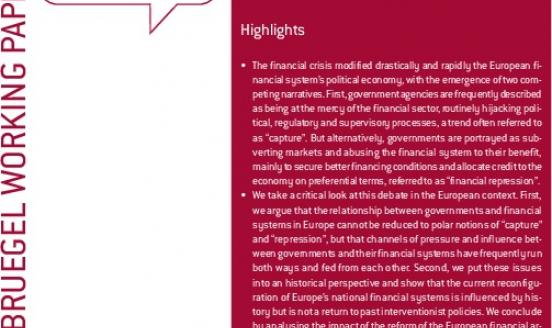The Weekender: Enhancing the Spanish program - A new Greek program
Dear All, World leaders are meeting in Los Cabos ahead of a G20 meeting that is likely to be relatively underwhelming. There is a good chance that th
Dear All,
World leaders are meeting in Los Cabos ahead of a G20 meeting that is likely to be relatively underwhelming. There is a good chance that the increase in the IMF resources will be solidified by formal and precise BRIC commitments. But most of the time will be spent pressuring Europeans to come together.
But the results of the Greek elections with a slight victory of New Democracy are likely to provide some relief to financial markets although it might tough to form a government and the reality remains that the current program is now running way off track and will certainly need to be renegotiated.
I will focus this week on both the redesign of the Spanish and Greek programs
-
Enhancing the Spanish program
-
A new Greek program?
Enhancing the Spanish program
Reactions to the outline of the Spanish program illustrate the extent to which financial markets are not ready to give the benefit of the doubt for more than a few hours. As I had mentioned before, they were two possible way to design a good Spanish program and these prescriptions haven’t been respected, hence the failure.
Europeans have opted for a targeted program to address the failing banking system. However, without a clear design they will be forced into a complete program taking Spain completely out of the primary market for a couple of years.
In order to avoid that, there are now two basic ways to dispel doubts about the current Spanish programme by improving/clarifying its design. Concerns have revolved primarily around the degree to which the programme would subordinate existing Spanish creditors and the extent to which banking sector-related losses could eventually cripple public finances.
One important source of concern is the choice of lending facility. The ESM is legally senior to standard bond creditors, and the bigger the programme, the lower down the capital structure existing creditors are likely to be. The EFSF is not de jure senior, but the notion of possible Official Sector Involvement remains taboo, so the risks of de facto subordination are high.
To address this issue and create incentives to improve the quality of the banking-sector restructuring process, there are two possible options:
- The EFSF would lend to the FROB, but would agree to an explicit burden sharing of any losses associated with the restructuring exercise. The Spanish government would take the first losses up to an amount to be specified, which doesn’t challenge debt sustainability (say, 10-15% of GDP). Over and above this level, there would be a degree of burden sharing between all member states (including Spain). This structure would create strong incentives for the EU countries to have a very intrusive programme and for the Spaniards to accept it with full disclosure. This burden-sharing agreement could also be time restricted, say, 2-3 years, in order to incentivise the Spanish authorities to move expeditiously.
- If the ESM were used along or instead of the EFSF, the question of seniority would become more difficult to overcome, but could still be mitigated. Indeed, the ESM could see its statutes amended, or its board of governors could amend its operational guidelines in order to be able to take direct equity stakes in the capital of Spanish banks. This would expose the ESM gains and losses associated with the restructuring process and would dispel risks that the Spanish government would end up shouldering the full cost of the recapitalisation up to the point of fiscal unsustainability.
The two options are in principle equivalent but the latter route might, however, take longer; the ESM isn’t ratified or operational yet and it would take time to modify its treaty or operational guidelines.
If this is not done quickly, Spain will lose market access completely. A redesigned and intrusive banking sector programme with risk sharing in addition to some simple monitoring of macroeconomic and public finances adjustment could deliver stabilization.
Discussions on the creation of a banking union and the need for a resolution authority are progressing and will be at the heart of the upcoming EU summit on 28-29 June. Ideally, this medium term discussion will
A new Greek program?
Although, high frequency budgetary data is blurred by the cash accounts and the accumulation of arrears, it is now increasingly clear that the program is severely off track. The victory of New Democracy over Syriza doesn’t change this fact and it has become unavoidable to open a discussion about the shape and form of a new Greek program.
This is fact that is now broadly acknowledged by policymakers and in particular by German officials who have openly discussed the possibility of stretching fiscal targets and allow the new Greek authorities to take full ownership of the program.
The key question is whether this new would require a new round of official assistance or whether it could actually work with a default on existing claims (hold out and other loans not covered by the PSI), a lowering of the interest rate charged to Greece down to quasi-concessional terms, a restructuring of official sector claims (ECB, IMF and EFSF)?
According to the program targets, the primary deficit for 2012 was meant to run around 500m a quarter. At the end of May, high frequency suggests that it is already at 1.7bn, however it is quite possible that the monthly data will show that Greece achieves a primary surplus by October/November. In 2013, the total primary balance was forecasted to be in surplus of 900m per quarter. Considering the growth outlook, it is unlikely but it appears doable to achieve a balanced position.
In Q3 2011, one could create some fiscal space by defaulting/restructuring the loans and hold outs (3.5bn) falling due during this period as well as restructuring the redemption and maturities that the ECB expects (3.1bn). In 2013, hold-outs, loans and debt to the ECB represent some 15.1bn. There seems to be some room for maneuver to restructure and/or default on some of these claims to improve the cash outlay of the Greek government, start paying down some of the 6bn of general government arrears.
The first reimbursements are due to the IMF only mid-2013 but in a quick look at the parameters of the program suggest that with continued fiscal consolidation, aggressive restructuring of remaining claims to the private sector and the ECB, one could extend fiscal targets without committing further funds.
The only potential additional burden that would require substantial additional financial contributions would be additional recapitalization needs by the financial sector. This was estimated to require some 28bn in Q3 but considering how far behind this process stands, it is quite possible that this process will be delayed further, thereby easing financing requirements in the short-term constraints.
In essence, here is another argument for setting up and effective supranational banking resolution mechanism: If Greece had an effective recapitalization/restructuring process, completely controlled (and therefore financed) by the EU, it could –with some tweaking– probably stay the course with the current program for the next couple of years and hope to make it through (although restructuring of the EFSF loans are very likely to require restructuring when they come due in 2020).
Happy to have your thoughts as usual,
Best Regards,


